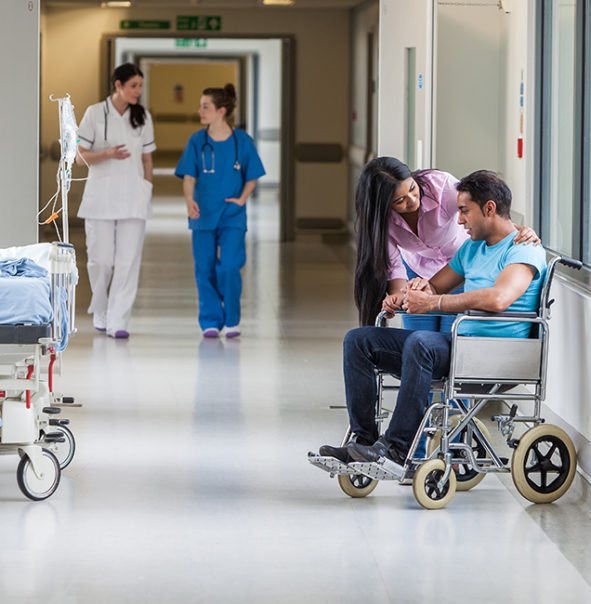Evaluation of the pilot tackling criminal exploitation of young people in Rotterdam
In 2021, the Centre for Child and Human Trafficking (CKM) conducted research into the nature and extent of criminal exploitation in the municipality of Rotterdam. This revealed that almost half (47%) of over 500 professionals interviewed were suspected to have been in contact with victim(s) of criminal exploitation. These include persons who are (or were) forced into money laundering, drug crime and recruitment for prostitution. Ecorys examined the effectiveness of a pilot initiative that aims to tackle this exploitation.
Background
In response to the findings of the CKM report and in line with the Rotterdam coalition agreement and the Rotterdam safety programme Veilig@Rotterdam, the municipality of Rotterdam is therefore developing a targeted approach to criminal exploitation.
In January 2023, the pilot ‘Tackling criminal exploitation’ started in the Rotterdam districts of Delfshaven and Lombardijen. This pilot focuses on signal recognition by professionals and on increasing the willingness of both young people and professionals to report. In addition, the pilot also focuses on improved coordination between parties involved in tackling criminal exploitation of young people. These include parties such as Urban Team Youth Work, ESSM of Stichting Humanitas and the police. The pilot consists of four components: a signal recognition training programme for professionals, an online and area-based communication campaign, the Care Table consultation and working agreements.
Commissioned by the municipality of Rotterdam, Ecorys studied the effectiveness of this pilot and specifically investigated why suspicions of criminal exploitation do not or hardly translate into concrete reports. These insights provide the municipality with tools to further develop the pilot in the future.
Key findings
We can conclude that the pilot Tackling Criminal Exploitation in the districts of Delfshaven and Lombardijen are perceived as positive. It is important to focus on criminal exploitation among young people in a targeted and integrated way. The various pilot components are logically connected and we do not see any major practical bottlenecks identified. Both the training and the campaign are in line with the need to create awareness among young people, improve signal recognition in practice and clarify action perspectives for professionals.
However, hardly any reports were received between July and November 2023, while the suspicions of criminal exploitation persist. This research notes a discrepancy between the number of suspicions and the number of reports and identifies several reasons why suspicions translate into reports only to a limited extent:
- There may be barriers for young people to ask for help themselves, make a report and/or cooperate with a report. For example, young people often do not identify themselves as victims because of, for example, fear of reprisals or distrust in the system.
- Recognising and reporting signs sometimes proves difficult for professionals. They are sometimes uncertain about their suspicions and face a high workload, so making a report is not always a priority.
- Professionals sometimes perceive their options for action as limited. Making a report can damage their relationship of trust with the young person and sometimes reporting is also not the right solution for the young person.
The above results are familiar and recognisable to the stakeholders spoken to, stressing that tackling criminal exploitation takes time. It takes time to make young people and professionals aware of what criminal exploitation entails, how it can be recognised and what can be done about it.
Based on our research, we make a number of recommendations to improve the pilot, for both the municipality and other parties involved.
Recommendations for the municipality
Above all, it can be recommended that the pilot approach to criminal exploitation in the neighbourhoods Delfshaven and Lombardijen and extend it to other neighbourhoods in Rotterdam. It is an important step in tackling criminal exploitation. The following specific recommendations can partially address the identified barriers to reporting.
- Given the positive evaluation of the training and the positive contribution made by this pilot component, the first recommendation is to follow up on training professionals.
- Existing counselling points can be better utilised to meet the need for professionals to spar with others about their suspicions, signals and doubts.
- Continuing education by youth workers in schools (as part of a communication campaign) is needed to increase awareness and knowledge among young people.
- Besides training professionals and educating young people, it is important to share positive experiences and stories of people who have reported criminal exploitation.
Recommendations for other parties
Based on our investigation, we make the following recommendations for other involved parties:
- For organisations acting as hotlines for professionals (including ESSM,
Coordination Centre against Human Trafficking, the police and Safe Home) it is important to (continue to) work on trust among professionals. - Parties that professionals can turn to with reports, cases and doubts can work on raising awareness among professionals.
- For those parties that play a role in tackling criminal exploitation (including the AVIM), it may be useful to approach exploitation from the offender’s perspective. A perpetrator-centred approach can help identify perpetrators of criminal exploitation and, as a ‘by-catch’, also gain insight into victims.
- Attention to, and investment in, providing protection is important to address the challenges around providing sufficient safety measures to reporters.

3 June 2024
4 minute read
Services
Key Experts
Daniek Korver
Consultant
Gabriëlle op 't Hoog
Senior Consultant



